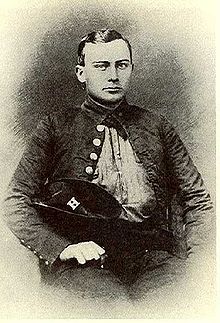Samuel R. Watkins
Samuel Rush Watkins (June 26, 1839 – July 20, 1901) was an American writer and humorist. He fought through the entire American Civil War and saw action in many battles. Today, he is best known for his memoir "Co. Aytch" (1882), which recounts his life as a soldier in the 1st Tennessee Infantry Regiment.

Quotes
edit"Co. Aytch" (1882)
edit- 1861 vs 1882. "Co. Aytch," Maury Grays, First Tennessee Regiment; or, A Side Show of the Big Show (Nashville, TN: Cumberland Presbyterian Publishing, 1882)
- America has no north, no south, no east, no west; the sun rises over the hills and sets over the mountains, the compass just points up and down, and we can laugh now at the absurd notion of there being a north and a south. ... We are one and undivided.
- pp. 2, 10, 233; cf. William Lowndes Yancey
- I always shot at privates. It was they that did the shooting and killing, and if I could kill or wound a private, why, my chances were so much the better. I always looked upon officers as harmless personages.
- p. 20
- He would have a man shot at the drop of a hat, and drop it himself.
- p. 27, on General Thomas J. "Stonewall" Jackson
- War had become a reality; they were tired of it. A law had been passed... called the conscript act. ... From this time on till the end of the war, a soldier was simply a machine, a conscript. ... All our pride and valor had gone, and we were sick of war and the Southern Confederacy.
- A law was made... allowing every person who owned twenty negroes to go home. It gave us the blues; we wanted twenty negroes. Negro property suddenly became very valuable, and there was raised the howl of "rich man's war, poor man's fight." The glory of the war, the glory of the South, the glory and the pride of our volunteers had no charms for the conscript.
- p. 38
- He was loved, respected, admired; yea, almost worshipped, by his troops. I do not believe there was a soldier in his army but would gladly have died for him. With him everything was his soldiers, and the newspapers, criticizing him at the time, said, "He would feed his soldiers if the country starved."
- p. 112, on General Joseph E. Johnston
- Well, on the fatal morning... the sun rose clear and cloudless, the heavens seemed made of brass, and the earth of iron, and as the sun began to mount towards the zenith, everything became quiet, and no sound was heard save a peckerwood on a neighboring tree, tapping on its old trunk, trying to find a worm for his dinner. We all knew it was but the dead calm that precedes the storm.
- p. 142, on the morning of the Battle of Kennesaw Mountain (June 27, 1864)
- Farewell, old fellow! We privates loved you because you made us love ourselves.
- p. 157, on Johnston's reassignment from command of the Army of Tennessee
- We were willing to go anywhere, or to follow anyone who would lead us. We were anxious to flee, fight, or fortify. I have never seen an army so confused and demoralized. The whole thing seemed to be tottering and trembling.
- p. 225, on the Army of Tennessee after the Battle of Franklin (November 30, 1864)
See also
editExternal links
edit- Encyclopedic article on Samuel R. Watkins on Wikipedia